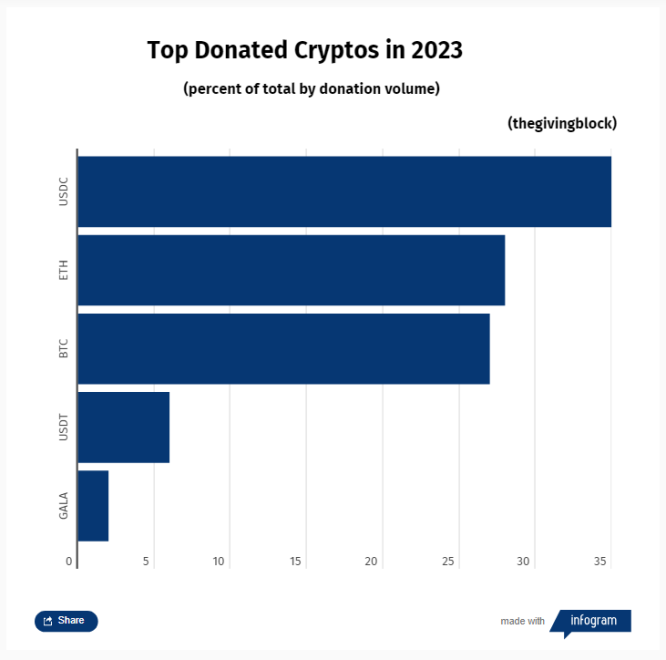American charities are experiencing a boon thanks to a new type of currency: cryptocurrency. By accepting donations in crypto such as Bitcoin, Ethereum, and other digital assets, nonprofits are seeing increased contributions, streamlined processes, and new donor demographics.
This year alone, the two largest US charities have reportedly raised over $2 billion through crypto donations, according to a recent report. Bankless Times report. This represents a considerable jump from the $125 million in donations raised throughout 2022. The Giving Block, a platform facilitating digital currency donations for charities, has been instrumental in this change.
Crypto Donations: A Boon for Efficiency and Convenience
The rise of crypto donations offers several benefits for both charities and donors. Platforms like The giving block simplify transactions, allowing donors to bypass complex international money transfers. This speeds up the process and ensures that donations reach their intended causes more quickly. Additionally, this type of giving often appeals to a younger generation who are tech-savvy and comfortable with digital transactions.

For charities, accepting crypto donations results in a larger funding pool. This allows them to access a global network of investors who may not have traditionally participated in philanthropy. This diversification can be crucial for organizations looking to expand their reach and impact.
Regulatory and security challenges
While the influx of crypto donations presents exciting opportunities, it also brings challenges. Charities must navigate a complex regulatory landscape to ensure compliance with Know your customer (KYC) and anti-money laundering (AML) laws.
These regulations are essential to preventing fraud and maintaining the integrity of the financial system. However, KYC/AML compliance can be a time-consuming and resource-intensive process for nonprofits.
Bitcoin is now trading at $66.673. Chart: TradingView
Additionally, the digital nature of cryptocurrencies exposes charities to cybersecurity risks. Hackers can target these organizations to steal the donated funds. To mitigate these risks, charities must invest in robust cybersecurity measures and stay up to date with the latest threats.
The future of philanthropy: promising prospects
Despite these challenges, the trend of crypto donations in the nonprofit sector shows no signs of slowing down. With the growing adoption of Bitcoin and growing public confidence in digital transactions, charities will likely experience a continued increase in digital currency contributions.
As the regulatory environment evolves and security protocols strengthen, crypto donations have the potential to revolutionize philanthropic giving, fostering a more efficient, transparent and globally connected giving ecosystem.
Featured image from Pexels, chart from TradingView


